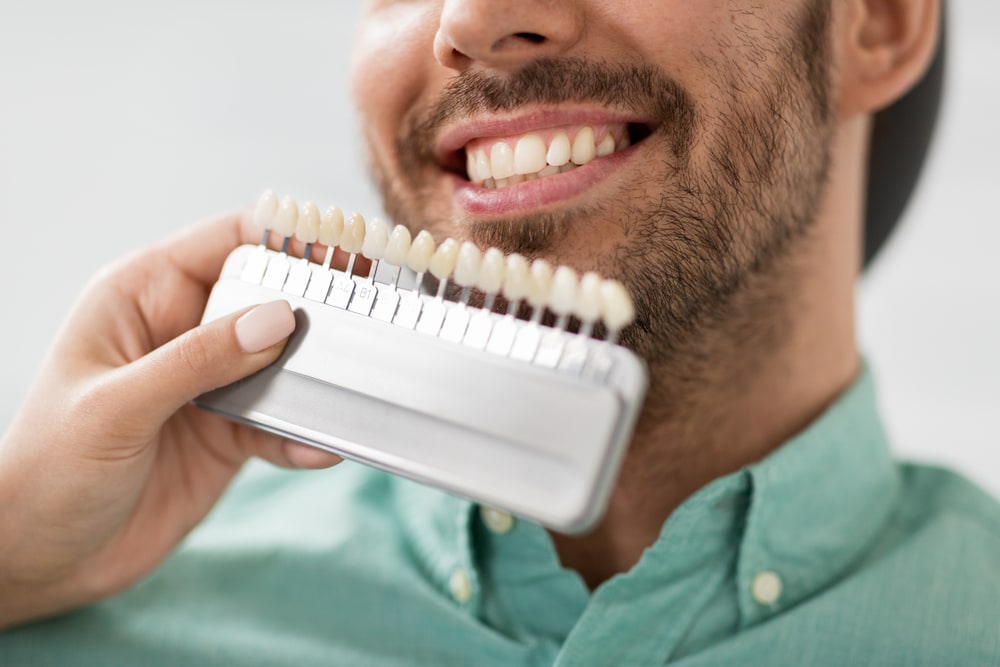Veneers are a popular cosmetic dental procedure that can help improve the appearance of your teeth. They are thin, custom-made shells that are designed to fit over the front of your existing teeth, covering up imperfections such as chips, cracks, stains, or gaps. There are several different types of veneers, each with its own set of advantages and disadvantages. In this article, we will discuss the different types of veneers, including porcelain veneers, composite resin veneers, Lumineers, immediate veneers, no-prep veneers, and temporary veneers.
Porcelain Veneers
Porcelain veneers are considered the gold standard of veneers, as they are the most durable and long-lasting option. They are also the most natural-looking, as they are made from a type of ceramic material that closely mimics the colour, translucency, and texture of natural tooth enamel.
Porcelain veneers are highly resistant to staining and discolouration, which makes them a good choice for people who drink a lot of coffee, tea, or red wine. They are custom-made in a dental laboratory and are then bonded to the front of your existing teeth with special dental cement.
Composite Resin Veneers
Composite resin veneers are made from a type of plastic material that is also used for tooth-coloured fillings. They are less expensive than porcelain veneers and can also be done in a single visit to the dentist. The composite resin material is applied directly to the front of your existing teeth and then sculpted and polished to match the shape and colour of your natural teeth. As per the professionals at Ruh Dental, “Unlike porcelain veneers, composite resin veneers are not as durable and may need to be replaced or repaired more frequently.”
Lumineers
Lumineers are a type of porcelain veneer that is ultra-thin and can be placed over your existing teeth without the need for any preparation. They are often referred to as “no-prep” or “minimal-prep” veneers, as they do not require the removal of any tooth structure. This makes the procedure for Lumineers less invasive than traditional porcelain veneers. Lumineers are made from a strong and durable ceramic material and are highly resistant to staining and discolouration. They can last up to 20 years with proper care.
Immediate Veneers
Immediate veneers are a type of veneer that can be placed on the same day as the initial consultation. This is possible because the veneers are pre-made and can be selected and adjusted to fit the patient’s teeth during the first appointment. The patient can walk out of the dentist’s office with a new smile.
No-prep Veneers
No-prep veneers are a type of veneer that does not require any preparation of the existing teeth. This makes the procedure for no-prep veneers less invasive than traditional porcelain veneers. They are thin, custom-made shells that are designed to fit over the front of your existing teeth without any removal of tooth structure. They are a good option for people who have healthy teeth and gums and who want to improve the appearance of their teeth without any tooth reduction. No-prep veneers are usually made of composite resin material, which is sculpted and polished to match the shape and colour of your natural teeth.
Temporary Veneers
Temporary veneers are a type of veneer that is typically used as a temporary solution for people who are considering a more permanent veneer option. These veneers are made of acrylic or composite resin materials and are not as durable as porcelain or composite resin veneers. They are placed on the teeth for a short period of time, usually a few weeks, to give the patient an idea of how their teeth will look with veneers before committing to a more permanent solution.
In conclusion, veneers are a popular cosmetic dental procedure that can help improve the appearance of your teeth. There are several different types of veneers, each with its own set of advantages and disadvantages. It is essential to consider the factors such as cost, longevity, durability and maintenance before choosing a type of veneer that is suitable for you.
